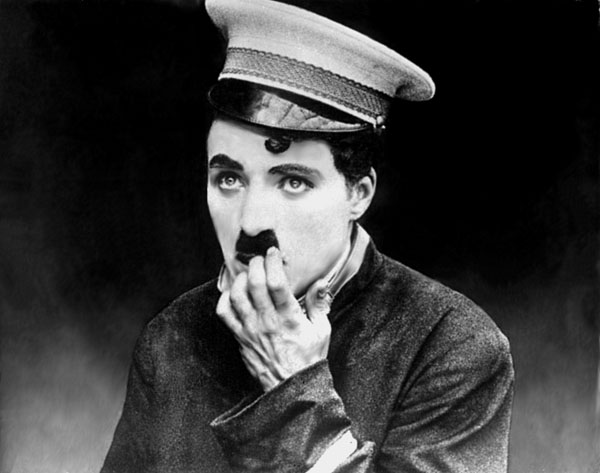I want to look ahead at some of the more notable events happening in the coming week or so, but first, a big deal. MoMA’s film preservation festival, To Save and Project, rolls on through November 22, and Saturday will be a very special evening indeed:
The Chaplin Project brings together a consortium of international archives with Lobster Films in Paris and the Cineteca di Bologna in Italy to restore all of Charles Chaplin’s short films and features. Serge Bromberg, who has helped spearhead this project as the founder of Lobster Films, presents the North American premieres of The Bank, A Night in the Show, and Easy Street—all made between 1915 and 1917, the period during which Chaplin was lured away from Mack Sennett’s Keystone Studios to produce comedies for the Essanay Film Manufacturing Company and, starting in 1916, the Mutual Film Company. During his acrimonious but pivotal career at Essanay, which ended in 1918, Chaplin took greater control over his films. By honing his comic timing and deepening the humor through pathos, romantic disillusionment, and fantasy, he turned the Tramp into an international phenomenon.
Tickling the ivories himself, Bromberg will be giving a lively demonstration of what’s been restored. Then on Monday, he’ll be at the Los Angeles County Museum of Art to present a program he calls The Costume of Silent Comedy: Charlie Chaplin and the Tramp.
NEW YORK
On Monday, the Museum of the Moving Image presents An Evening with Darren Aronofsky, Patti Smith and Noah.
Anthology Film Archives is celebrating the 50th anniversary of the Austrian Film Museum through Sunday.
Two events to know about happening at Microscope Gallery: Paris, 1980s: Deconstructed Narratives and Late Formalisms: 16mm films by Jean-Pierre Bertrand, David Wharry, Unglee, Jakobois, and Téo Hernandez (tonight!) and Elegant Interiors: Videos & Live Music by Alice Cohen (Saturday).
Recommendations from the L: Elina Mishuris on Andrei Tarkovsky‘s The Sacrifice (1986; through November 25 at BAM), Aaron Cutler on Ryszard Bugajski’s Interrogation (1982; tomorrow at MoMI) and on Peter Lorre‘s The Lost One (1951; tomorrow and Sunday at Anthology), Dan Sullivan on Mati Diop‘s A Thousand Suns (2013; Monday at Anthology), Abbey Bender on François Ozon’s Swimming Pool (2003; Tuesday at FIAF) and Samantha Vacca on Peter Watkins‘s The War Game (1965; Tuesday at Light Industry).
LOS ANGELES
Tonight. The Filmforum presents Andy Warhol: Light and Dark, with Music by Ezra Buchla.
SPECTREFEST: Metropolis (w/ live score by Chrome Canyon, encore trailer) from Cinefamily
Screening for free Sunday morning at the UCLA Film & Television Archive: Ray Ashley, Morris Engel, and Ruth Orkin‘s seminal Little Fugitive (1953).
On Tuesday, Melnitz Movies celebrates Bruce Conner’s birthday by inviting “renowned restorationist Ross Lipman to present his multimedia lecture on the production of Conner’s 1976 film Crossroads.”
SAN FRANCISCO
The Yerba Buena Center for the Arts will be screening Gabe Klinger‘s award-winning documentary Double Play: James Benning and Richard Linklater tonight, followed by Benning‘s Easy Rider (2012), and then again on Saturday, followed by Linklater‘s Tape (2001). Max Goldberg at EatDrinkFilms:
Benning is the avant-garde troubadour, the lone wolf on the road. He cuts a familiar figure in this respect, though his twinned replicas of Henry David Thoreau and Ted Kaczynski (Two Cabins) makes clear that he’s alert to the ambiguities of seclusion. For his part, Linklater comes as close to achieving a popular cinema of one’s own as can be imagined in today’s American cinema. While for many years alternating between more forthrightly commercial and personal projects, he remained uniquely tethered to his own strengths as a storyteller. Bernie (2011), Before Midnight (2013) and Boyhood (2014) are the fruit of this self-assuredness. Linklater is more of an insider than Benning, certainly, but he’s also the rarer bird. Academia has shored up many of Benning’s disciples, after all, but it’s difficult to imagine a studio backing a younger director’s Boyhood.
The French Had a Name for It: Classic French Noir from the 40s through the 60s is a series running at the Roxie from tomorrow through Monday and Michael Guillén‘s got a big overview at the Evening Class.
Writing for Film International, Janine Gericke previews the Film Society’s Hong Kong Cinema series, opening tomorrow and running through the weekend.
Saturday sees a benefit auction of the San Francisco Cinematheque.
SEATTLE
So let’s assume you’ve seen Orson Welles‘s Touch of Evil (1958). On Saturday, Sean Axmaker will host of “Cinema Dissection” in the SIFF Film Center Classroom. Over a period of six hours, the audience will be free “to stop the film at any time to make an observation or ask a question of the other participants.”
Lav Diaz’s Norte, the End of History (2013) begins its week-long run at Northwest Film Forum tomorrow and, in the Stranger, Charles Mudede explains why you really much catch it if you can.
AUSTIN
Word from the Chronicle‘s Marc Savlov: “Thai ghost stories, documentaries decrying the affect of modernization on traditional Eastern ways of living (and dying), badass stuntmen direct from cinematic Chinatown alleyways, and vengeful green dragons are all part of the seventh Austin Asian American Film Festival, which had been dormant since its 2009 season and returns for a Nov. 13-17 berth at the Marchesa Hall & Theatre.”
ACROSS THE ATLANTIC
Newcastle. On Saturday, the Star and Shadow Cinema will host Unearthing Forgotten Horrors, “an annual mini-fest of folk horror cinema, short film and spooked live music.”
Vienna. The Austrian Film Museum’s retrospective Gregory J. Markopoulos opens on Wednesday and runs through November 24.
Zurich. Alexandra Navratil’s Plunge / Soar is on view at BolteLang through November 29. Aoife Rosenmeyer for Art Agenda: “In addition to her reflection on early sources of film materials and processes, Navratil’s use of archival footage illuminates certain dynamics of colonial wealth creation, illustrating, too, how film was instrumentalized to further imperial aims.”
For news and tips throughout the day every day, follow @KeyframeDaily. Get Keyframe Daily in your inbox by signing in at fandor.com/daily.




